
Letter from Our Board Chair and CEO
Partners and Friends,
For far too long, we’ve been told that we must choose between justice and safety, that those two goals are in direct competition. But the reality is that to achieve true justice, we must build safety. And for communities to feel truly safe, they must feel the presence of justice.
Every day, the work we do with systems and communities shows that we need justice and safety—economic opportunity for everyone, stable affordable housing, and safe streets, free of crime and violence.
At the Center for Justice Innovation, we help people achieve justice and safety using an approach we call Community Justice.
Community Justice brings everyone—communities, courts, non-profits, the private sector, and local government—to the table to build strong, healthy communities.
Over the past 30 years, we’ve partnered with the courts to help hundreds of thousands of program participants get jobs, support their families, and address personal challenges, like substance use or mental health issues. We’ve worked alongside community members to reduce gun violence, spark economic development, transform public spaces, and empower young people to be active participants in the decisions that affect their communities. And our researchers, analysts, and practitioners have partnered with justice systems across the country to implement new approaches—like alternatives to incarceration and restorative justice practices—that reduce the harms of the justice system, elevate the voices of residents and those most directly impacted, and improve safety and justice for everyone.
In the year ahead, we will continue to invest in Community Justice to bring government and communities together to build safety and justice for as many people as we can. Thank you for being part of this vital work.
Rasmia Kirmani
Board Chair
Courtney Bryan
Chief Executive Officer
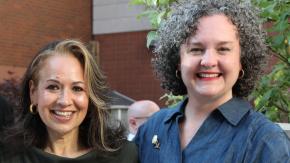
Rasmia Kirmani (left) and Courtney Bryan (right).
Our Mission
The Center for Justice Innovation is a community justice organization that centers safety and racial justice in partnership with communities, courts, and the people most impacted.
At the Center, we know it takes everyone at the table to deliver justice and safety. For more than 30 years, we’ve bridged courts and communities to build solutions that prevent harm, reduce system involvement, and strengthen community well-being, guided by our commitment to using rigorous research and data to create meaningful change and advance what works.
Our teams reach thousands of people each year across the United States and around the world seeking to improve their justice systems and build safer, more vibrant neighborhoods. Read on for a snapshot of our work throughout 2024 preventing incarceration, investing in mental health support, expanding access to opportunity, and empowering community-driven solutions.
*All data below pertain to Fiscal Year 2024 (July 2023 to June 2024).
Reducing Incarceration, Addressing Trauma
In both courts and communities, we craft effective, innovative responses to crime that reduce incarceration, prevent violence and trauma, and promote healing for all.
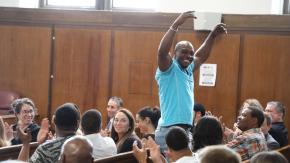
Providing Alternatives to Incarceration
We improved community safety while reducing our overreliance on incarceration by connecting people in court to resources like mental health support, substance use treatment, and job training as an alternative to jail and prison. By completing their court mandates in the community under judicial supervision, participants can have their charges reduced or dismissed while getting help with the underlying challenges that brought them into the system.
We seeded Community Justice nationwide by supporting 420 government agencies and nonprofits across the country, helping them implement local solutions like alternatives to incarceration and problem-solving courts. We also partnered with New York Law School to launch the Institute for Justice Policy Implementation dedicated to making crucial justice reforms work on the ground.

Our report shows how courts across the country are working to better support people with histories of trauma, featuring lessons learned in 20 states.
Reducing Pretrial Detention
This year, the Center partnered with the New York State Unified Court System to lead a new set of reforms to reduce administrative delays that can leave people in jail for months or years awaiting trial—bringing us a step closer to closing the jails on Rikers Island once and for all.
As a provider of New York City’s Supervised Release Program, we ensure people make their court dates while connecting them to community-based resources like counseling, job training, and benefits. Since we helped pilot the program in Brooklyn, it has been implemented across the entire city as a safe, effective alternative to bail and pretrial detention that helps address the underlying challenges often associated with involvement in the justice system.
Everyone, regardless of their past, deserves to build a strong future.
— JANELLE DAVIS, Supervised Release Program
With support from the MacArthur Safety and Justice Challenge, we have helped Philadelphia’s legal system move forward on crucial reforms like safely reducing the use of bail and investing in community-based services, informed by the perspectives of formerly incarcerated people.
10,000+ people in our diversion and alternative-to-incarceration programs had their charges reduced or dismissed after successfully completing programming
10,565 people served in our Supervised Release programs
Promoting Trauma-informed Practices in Family Court
Our work in family court to break cycles of intergenerational trauma, reduce unnecessary separation, and strengthen parent-child relationships has steadily grown to include all five boroughs of New York City, Westchester, and Erie County. With peer mentorship for young people exposed to violence, parent-child therapy, connections to services for non-custodial parents, and judicial education on infant mental health, our Family Court Programs address the complex challenges that bring people into the child welfare system with a focus on children’s unique development needs.
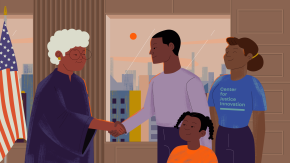
Preventing Violence, Centering Change
Our teams in Brooklyn and the South Bronx take a public health approach to preventing gun violence by de-escalating conflicts, changing community norms, and creating safe spaces where people can heal from trauma.
The RISE Project, which focuses on the intersection of gun violence and intimate partner violence, engaged hundreds of community members this summer in rallies against relationship violence, candid discussions about gender and masculinity, and youth-led wellness fairs. Building on our large-scale participatory action research on youth gun culture, we also launched the Street Action Network, a unique initiative that connects with young people involved in gangs in New York City and other cities across the country to amplify their voices and drive sustainable solutions to gun violence.
Restorative justice is another alternative to typical justice responses that draws on Indigenous practices to foster dialogue between people who have caused harm, victims, their families, and the impacted community. Our programs utilize a process that restores agency to survivors and victims of crime, while giving those who have done harm a chance to accept responsibility and work towards repair.
Our Gender and Family Justice team provides training and guidance to communities across the country to help them respond more effectively to intimate partner violence, enhancing safety for survivors while engaging those who cause harm in a process of accountability and behavioral change.

298 children and parents supported through our Strong Starts family court model
1,127 people engaged in restorative justice across NY State
Mental Health Support as Safety
For people with serious mental illness, jail and prison are often the last in a long list of systems that have failed to meet their needs. At the Center, we take a full-spectrum approach to providing people who have mental health needs with holistic, personalized support, whether they’re in court, in shelters, or out in the community. We also work to promote policies that prioritize treatment, supportive housing, and services—not incarceration—for people in crisis.
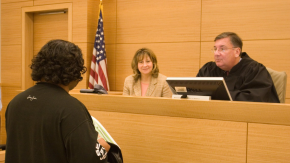
Supporting People with Mental Health Needs in the Justice System
In partnership with the court systems of New York and New Jersey, we support people with mental health challenges by providing community-based services as an alternative to jail and prison. At the Brooklyn Mental Health Court and Manhattan Justice Opportunities, we’ve expanded the horizon of reform and reduced recidivism by crafting individualized, community-based responses—including mental health and substance use treatment, supportive housing, and help with education and employment—for people charged with serious felony offenses, treating each case as an opportunity to positively alter the direction of a person’s life.
Our national teams use their expertise to drive similar reforms across the country. With our support, Los Angeles County’s Rapid Diversion Program has diverted more than 2,000 criminal cases as of 2024, connecting people to holistic mental health support instead of jail. Our Recovery and Reform team also worked with five states to help reduce racial disparities in drug treatment courts, sharing what they learned in a research report to inform similar efforts around the country.
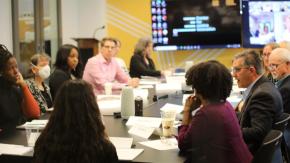
We convened a national roundtable for clinicians and experts to share their insights on providing meaningful mental health interventions within the confines of the criminal justice system.
Preventing Mental Health Crises through Early Interventions
Nobody should have to wait until they’re at risk of incarceration to receive care. That’s why we invest in prevention, connecting people with mental health challenges to treatment, housing help, job support, and other vital services before they’re facing crisis.
In Misdemeanor Mental Health Courts, we offer people with mental health needs charged with low-level offenses a path out of the justice system and into community-based care. Our outreach teams in Syracuse, NY, and Midtown Manhattan engage people even earlier, forging relationships on the streets and in shelters to prevent overdoses, build bridges to long-term services, and prevent justice system involvement.
Our Recovery and Reform team, which helps drug treatment courts across the country improve their responses to people struggling with substance use, has moved “upstream” over time, driving reforms that connect people to treatment before they’re facing serious charges.
I could be in jail… but I changed my life… and have been on a trajectory of going up because of Midtown.
— IBRAHIM AYU, graduate of one of our mental health programs
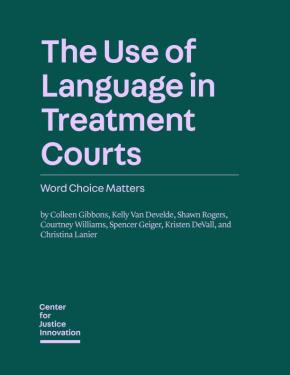
Our research on the use of language in treatment courts offers recommendations for practitioners to combat stigma and support better outcomes for participants across the country
Advocating for Greater Investment in Mental Health Services
Thanks in part to our advocacy, New York Governor Kathy Hochul visited our Midtown Community Justice Center to announce a $33 million investment to expand mental health services for New Yorkers in the criminal justice system, including those offered at the Community Justice Center.
We don't want to see people locked up as the solution.
— GOVERNOR KATHY HOCHUL at Midtown Community Justice Center
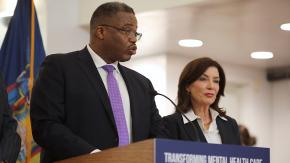
469 people served in our mental health courts
1,192 people assisted by our street outreach teams in Manhattan and Syracuse
5,353 people in our alternatives to incarceration and detention programs had mental health needs
Access to Opportunity
At the Center, we recognize that building lasting public safety means expanding economic opportunities, responding to gaps in education, and addressing inequalities rooted in systemic racism and disinvestment. That’s why we work with a wide range of partners to increase access to opportunities for all—like finding work, obtaining housing, and providing for one’s family—inside and outside of court.
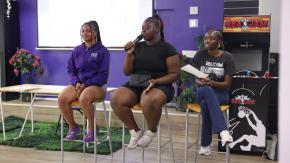
Responding to Crime while Reducing the Harms of the Justice System
Any contact with the criminal justice system, however brief, can jeopardize a person’s income, housing, and immigration status. Project Reset brings law enforcement, prosecutors, and public defenders together to re-engineer the response to low-level crime in ways that minimize those disruptions, allowing people to resolve their criminal case through brief programming—like counseling, discussion groups, and art therapy—without missing time at work or school. Since we helped launch the program nearly a decade ago, it has become a citywide model for responding constructively to minor offenses.
Expanding Opportunity at our Community Justice Centers
We set people up for stronger futures by connecting them to education and employment resources. In neighborhoods that have been impacted by disinvestment, our Community Justice Centers offer GED classes, resumé building, financial empowerment workshops, career guidance, and more for all residents, inside and outside the justice system.
This year, we launched our newest Community Justice Center in New Rochelle, which takes an innovative approach to reducing crime and fostering safety through internship opportunities and peer mentors for young people, anti-gun violence workshops, and partnerships with local businesses. The Justice Center expands on our work in New Rochelle supporting a court program that offers a pathway to education and employment opportunities for justice-involved youth.
Investing in Strong Futures for Young People
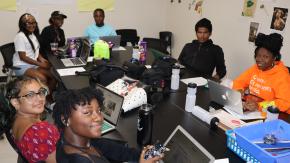
At the neighborhood level, we build economic justice by opening career paths for young people and investing in their talents. With our Brownsville Girls Collaborative, we offer young women an intensive leadership program that helps them break into industries in which women of color are often underrepresented. We also partnered with New York City’s Summer Youth Employment Program to give young people paid work experience in digital media, photography, and social impact fields like community organizing and direct services.
234 young people received meaningful summer work experience at our sites across NYC
Aside from the economic justice benefits, the most meaningful part has been hearing from young people that they specifically chose Queens Community Justice Center as their worksite because of their fondness for our programming. They’ve expressed how safe they feel here and how they’ve benefited from the programs they’ve participated in and the relationships they’ve built with our staff.
— WESLEY THOMPSON, Queens Community Justice Center
We supported the first-ever Inside Literary Prize to give people in prisons across the country a chance to participate in the cultural conversation by serving as judges in a national book award.
The Center for Justice Innovation is committed to elevating the voices of those impacted by the legal system and building safe, strong, just communities. The Inside Literary Prize uses the power of books to support the dignity of those who are incarcerated, valuing their insight and celebrating our shared humanity.
— COURTNEY BRYAN, Center for Justice Innovation
Community Empowerment
For many, public safety means stopping crime. But if we think of public safety only as the absence of crime, we risk overlooking all the things that need to be present for us to be safe: affordable homes, vibrant public spaces, connection with our neighbors, and much more.
Strong communities are safe communities. That truth is at the heart of our work empowering community members to solve local challenges and build lasting safety and justice.

Putting Residents at the Center of Public Spaces
With an approach called placekeeping, we organize community-led projects where teams of residents work together to revitalize neglected public spaces. This year, one project led by public housing residents at the Polo Ground Towers in Harlem led to the creation of a new, multisensory “playscape” catering to neurodivergent children.
Public housing residents also take the lead to strengthen well-being and enhance safety in their housing developments. To deepen community involvement in public investments and decision-making, our Neighborhood Safety Initiatives team organizes participatory budgeting projects where people living in New York City Housing Authority (NYCHA) buildings vote on how they would like to see new funding put to use in their communities. This year, more than 800 residents of the Bronx’s Castle Hill Houses voted on a new BBQ area and dog park in their development—the first ever on a NYCHA campus.
Supporting Community-led Investments
Each year, young people from our Brownsville Community Justice Center mark the end of their summer programming in digital media and music production with [B]Live, a music and arts festival celebrating resilience and talent in Brownsville. This year’s [B]Live featured live performances from iconic artists like Dave East, Cassidy, and Jesse Royal, plus creative arts stations, local food trucks, connections to resources, and free haircuts and manicures for residents.
[B]Live is more than just a festival—it’s a celebration of our strength, creativity, and everything that makes us proud to call this place home.
— KWESI JOHNSON, Brownsville Community Justice Center
102,000 total attendance at our community events
3,859 residents helped by our housing teams
Building Justice in Housing
Stable, affordable housing is a basic human right and a prerequisite for well-being. We’ve helped thousands of New York and New Jersey residents stay safely housed by providing rental assistance, helping tenants get critical repairs and teaching them about their rights, and ensuring residents can get rent adjustments when their income changes. We also work towards long-term housing stability through financial education, help with budgeting, and connections to legal services and public benefits.

In our report based on a nationwide survey, we explore innovative initiatives across the country that disrupt cycles of housing insecurity and criminal justice involvement.
Financials
July 1, 2023 – June 30, 2024
Total in Expenditures: $104,868,000









